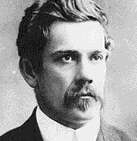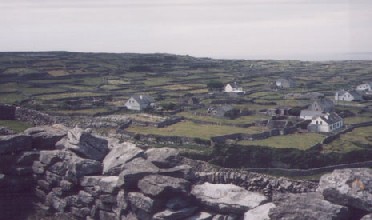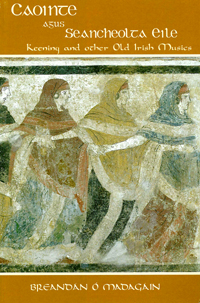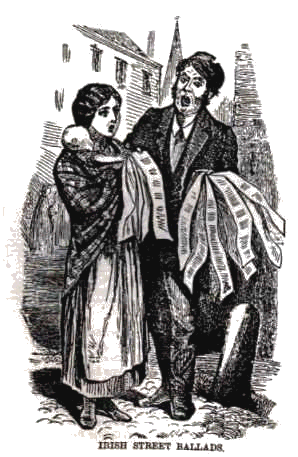 |
FolkWorld Issue 36 07/2008; Article by John Millington Synge
A Dreary Rock Sloping Up from the Sea
Excerpts from John Millington Synge's 'The Aran Islands' (1907)
Irish playwright John Millington Synge (1871-1909),
himself a devoted fiddler, spent each summer during 1898 and 1902 on the Aran Islands
off the west coast of Ireland to learn the Irish language.
'The Aran Islands' can be read for its sociological interest only,
giving a glimpse on the life of the Aran peasantry at the turn
of the 20th century, but it can also be seen in its context as essential
material for his plays 'Riders to the Sea' and 'The Playboy of the Western World.'

The geography of the Aran Islands is very simple, yet it may need a word to itself. There are three islands: Aranmor, the north island, about nine miles long; Inishmaan, the middle island, about three miles and a half across, and nearly round in form; and the south island, Inishere--in Irish, east island,--like the middle island but slightly smaller. They lie about thirty miles from Galway, up the centre of the bay, but they are not far from the cliffs of County Clare, on the south, or the corner of Connemara on the north.
The steamer which comes to Aran sails according to the tide, and it was six o'clock this morning when we left the quay of Galway in a dense shroud of mist. In about three hours Aran came in sight. A dreary rock appeared at first sloping up from the sea into the fog; then, as we drew nearer, a coastguard station and the village.
A little later I was wandering out along the one good roadway of the island, looking over low walls on either side into small fields of naked rock. I have seen nothing so desolate. Grey floods of water were sweeping everywhere upon the limestone,
 |
I have decided to move on to Inishmaan, where Gaelic is more generally used, and the life is perhaps the most primitive that is left in Europe. I spent all this last day with my blind guide to visit one of the ancient beehive dwellings that is still in perfect preservation. When we crawled in on our hands and knees, and stood up in the gloom of the interior, old Mourteen took a freak of earthly humour and began telling what he would have done if he could have come in there when he was a young man and a young girl along with him. Then he sat down in the middle of the floor and began to recite old Irish poetry, with an exquisite purity of intonation that brought tears to my eyes though I understood but little of the meaning.
Most of the strangers they see on the islands are philological students, and the people have been led to conclude that linguistic studies, particularly Gaelic studies, are the chief occupation of the outside world. 'I have seen Frenchmen, and Danes, and Germans,' said one man, 'and there does be a power a Irish books along with them, and they reading them better than ourselves. Believe me there are few rich men now in the world who are not studying the Gaelic.'
After Mass this morning an old woman was buried. While the grave was being opened the women sat down among the flat tombstones and began the wild keen, or crying for the dead. Each old woman, as she took her turn in the leading recitative, seemed possessed for the moment with a profound ecstasy
 |
This young man had come up to bring me a copy of the 'Love Songs of Connaught,' which he possesses, and I persuaded him to read, or rather chant me some of them. When he had read a couple I found that the old woman knew many of them from her childhood, though her version was often not the same as what was in the book. She was rocking herself on a stool in the chimney corner and several times when the young man finished a poem she took it up again and recited the verses with exquisite musical intonation, putting a wistfulness and passion into her voice that seemed to give it all the cadences that are sought in the profoundest poetry.
The mode of reciting ballads in this island is singularly harsh. I fell in with a curious man to-day beyond the east village, and we wandered out on the rocks towards the sea. When we had gone through the usual topics he asked me if I was fond of songs, and began singing to show what he could do. The music was much like what I have heard before on the islands--a monotonous chant with pauses on the high and low notes to mark the rhythm; but the harsh nasal tone in which he sang was almost intolerable. His performance reminded me in general effect of a chant I once heard from a party of Orientals I was travelling with in a third-class carriage from Paris to Dieppe, but the islander ran his voice over a much wider range.
His pronounciation was lost in the rasping of his throat, and, though he shrieked into my ear to make sure that I understood him above the howling of the wind, I could only make out that it was an endless ballad telling the fortune of a young man who went to sea, and had many adventures. The English nautical terms were employed continually in describing his life on the ship, but the man seemed to feel that they were not in their place, and stopped short when one of them occurred to give me a poke with his finger and explain gib, topsail, and bowsprit, which were for me the most intelligible features of the poem. Again, when the scene changed to Dublin, 'glass of whisky,' 'public-house,' and such things were in English.
This year I have brought my fiddle with me so that I may have something new to keep up the interest of the people. I have played for them several tunes, but as far as I can judge they do not feel modern music, though they listen eagerly from
 |
About six o'clock I was going into the schoolmaster's house. I went into the kitchen and began tuning the fiddle, as the boys were impatient for my music. At first I tried to play standing, but on the upward stroke my bow came in contact with the salt-fish and oilskins that hung from he rafters, so I settled myself at last on a table in the corner, where I was out of the way, and got one of the people to hold up my music before me, as I had no stand. I played a French melody first, to get myself used to the people and the qualities of the room, which has litle resonance between the earth floor and the thatch overhead. Then I struck up the 'Black Rogue,' and in a moment a tall man bounded out from his stool under the chimney and began flying round the kitchen with peculiarly sure and graceful bravado.
The lightness of the pampooties seems to make the dancing on this island lighter and swifter than anything I have seen on the mainland, and the simplicity of the men enables them to throw a naïve extravagance into their steps that is impossible in places where the people are self-conscious. The speed, however, was so violent that I had some difficulty in keeping up, as my fingers were not in practice, and I could not take off more than a small part of my attention to watch what was going on.
I struck up another dance--'Paddy get up'--and the 'fear lionta.' The word went round that an old man, known as Little Roger, was outside, and they told me he was once the best dancer on the island. For a long time he refused to come in, for he said he was too old to dance, but at last he was persuaded. It was some time longer before he would take his turn, and when he did so, though he was met with great clapping of hands, he only danced for a few moments. He did not know the dances in my book, he said, and did not care to dance to music he was not familiar with.
After the dancing and excitement we were too stirred up to be sleepy, so we sat for a long time round the embers of the turf,
 |
A man who lives in the other end of the village got his gun one day and went out to look for rabbits in a thicket near the small Dun. He saw a rabbit sitting up under a tree, and he lifted his gun to take aim at it, but just as he had it covered he heard a kind of music over his head, and he looked up into the sky. When he looked back for the rabbit, not a bit of it was to be seen. He went on after that, and he heard the music again. Then he looked over a wall, and he saw a rabbit sitting up by the wall with a sort of flute in its mouth, and it playing on it with its two fingers.
This evening we had a dance in the inn parlour. There was no masters of ceremonies, and when I had played two or three jigs and other tunes on my fiddle, there was a pause, as I did not know how much of my music the people wanted. For a moment a deadlock seemed to be coming, but a young girl saw my difficulty, and took the management of our festivities into her hands. At first she asked a coastguard's daughter to play a reel on the mouth organ, which she did at once with admirable spirit and rhythm.
When they had gone I had a long evening with the scholar and two story-tellers taking down stories and poems. We were at work for nearly six hours, and the more matter we got the more the old men seemed to remember. 'And now'--[said the younger] taking up his glass of whisky--'here's to your good health, and may you live till they make you a coffin out of a gooseberry bush, or till you die in childbed.' After that I had to get out my fiddle and play some tunes for them while they finished their whisky. The next day I left with the steamer.
Photo Credits:
(1) John Millington Synge;
(2) Inisheer;
(3) Keening and Other Old Irish Musics;
(4) Irish Street Ballad;
(5) Irish Dancing.
|
To the German FolkWorld |
© The Mollis - Editors of FolkWorld; Published 07/2008
All material published in FolkWorld is © The Author via FolkWorld. Storage for private use is allowed and welcome. Reviews and extracts of up to 200 words may be freely quoted and reproduced, if source and author are acknowledged. For any other reproduction please ask the Editors for permission. Although any external links from FolkWorld are chosen with greatest care, FolkWorld and its editors do not take any responsibility for the content of the linked external websites.
